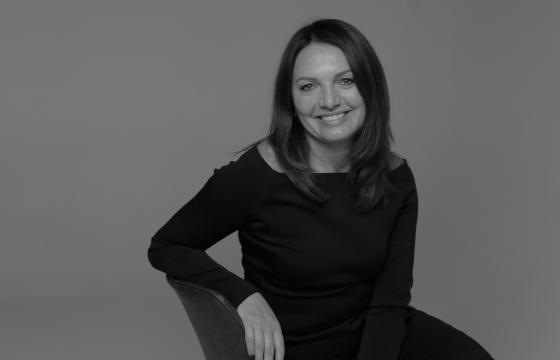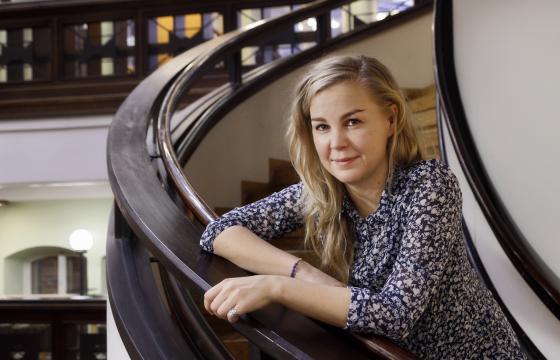
Moe Mustafa has always been his family’s artistic maverick. Therefore, his mother reacted calmly to her son’s announcement that he was moving from Italy to Finland.
– Wrap up, then. It’s cold there.
Mustafa had travelled to Italy as a photographer and actor in a journalism theatre company. He had been interested in theatre since university.
– I gathered together some friends and directed them on stage: go that way, do this. Later I worked in my first real profession as a graphic designer, but I wanted more. I thought a lot about our physical being and how worlds can be created on stage, Mustafa says.
Debut play on a tough subject
From Italy, Mustafa arrived in Imatra. He made friends with people, learnt Finnish and exhibited photographs at Virta Cultural Centre. Unfortunately, his more ambitious professional goals did not seem feasible in small-town Eastern Finland.
– I went to Ylöjärvi to study TV and film studies at Voionmaa Institute. I had to interrupt my studies and return briefly to Imatra due to a lack of funds. But then my world turned upside down.
He was admitted to study at Tampere University of Applied Sciences. His debut as a playwright and director came already before graduating as a Bachelor of Cultural art and media.
The play When a Rainbow is Black consisted of four monologues on harassment and rape experienced by homosexuals, of which one was Mustafa’s own. Not for Men, on the other hand, combined theatre with a video installation to portray social, familial and sexual conflicts from the perspectives of four women.
Mustafa was nervous about his first collaboration with a major theatre company, but the team at the Tampere Theatre managed to allay most of his anxiety with their welcoming and friendly attitude. The video installation created for the play Pakolaiset (“Refugees”) was a huge success.
A grant can help you feel appreciated
Just over a year ago, director and artist Moe Mustafa had no project to work on. It was a sad period for such an active and forward-looking person. He was browsing the internet in slight desperation when he spotted an open grant application period and filled in the application.
Mustafa never believed he would receive a grant – he was just trying his luck. Having pressed Send he forgot all about it, until the approval letter came in the post. He was overjoyed by the grant: the fact that he and his work had been seen.
In May Mustafa flew to Finland from Berlin for two days to accept his grant diploma.
– The least I could do to show my gratitude for the grant was to be there in person. I hardly knew anyone at the party, but it was wonderful to be there and feel a part of the community.
Classics and all-new material on the way
With his one-year grant, Mustafa intends to write three plays and direct one of them. They will include new adaptations of Franz Xaver Kroetz’s classic Request Concert and Valery Bryusov’s psychodrama The Wayfarer. The third play, Mustafa’s original manuscript, will delve into the philosophy of existentialism and our awareness of others.
Right now, he is dedicating his time and energy to finding the work group and venue for the first of the three performances. Luckily, he has the support of a producer and the project is progressing step by step and negotiation by negotiation.
– As a newcomer you have to work twice as hard to be seen in the industry. I am prepared for that, but at the same time I wish that big theatres had more opportunities for new authors and perspectives.
In Finland, where most directors are alumni of the same school, a self-taught director from a different background can contribute something completely new.
– I am particularly interested in visuality: how actors move, as well as artistic composition in general. My style is avant-gardist.
Touched by sensitive subjects
In his work, Mustafa handles psychological and social issues such as loneliness, isolation and exclusion; issues familiar both to Finnish culture and to the author himself.
– Being part of minority is not a new thing to me, I have experienced it my whole life. I was born in Kuwait to Palestinian parents, and we moved to Jordan during the Gulf War. I have now lived in Finland for ten years and am a Finnish citizen, but with my black hair and beard I am an atypical Finn.
This year Mustafa has realised that even the winter darkness can offer some common ground for people of Middle-Eastern and Finnish origins.
– The darkness has felt heavier and more oppressive than ever before. On the other hand, now I am able to share the experience with other Finns: Ah, so this is what it’s like.
Mustafa also looks to arouse emotions with his art.
– I don’t want to force viewers to accept ready-made solutions or to think like I do. I want to ponder, provoke ideas, create connections and awaken feelings.
And what of his plans for the future?
– I have a lot. I am currently applying for Master’s studies. After that I’m hoping for a PhD and possibly to teach at a university or university of applied sciences. In the theatre world, I will work more actively and strive for larger stages.



